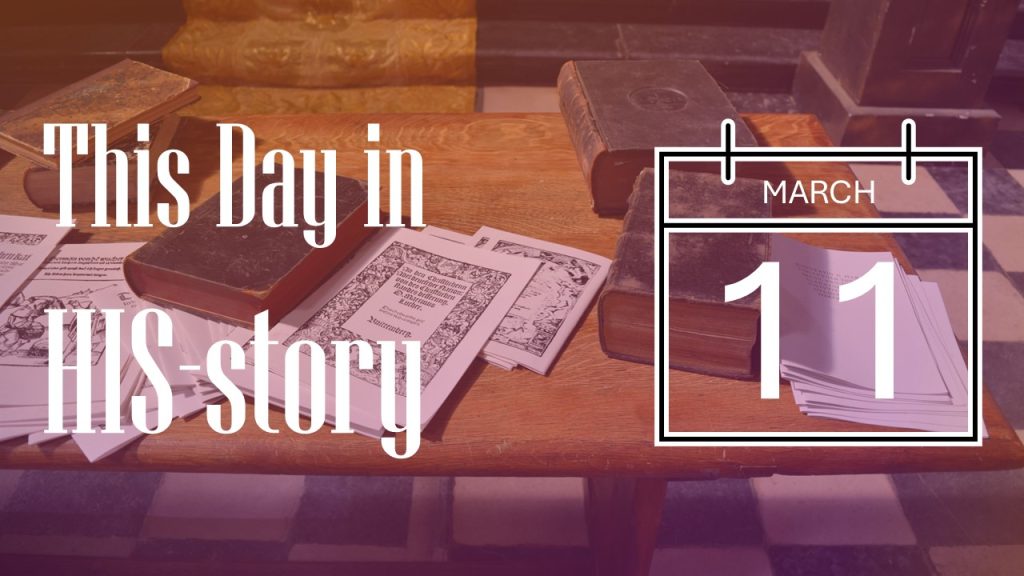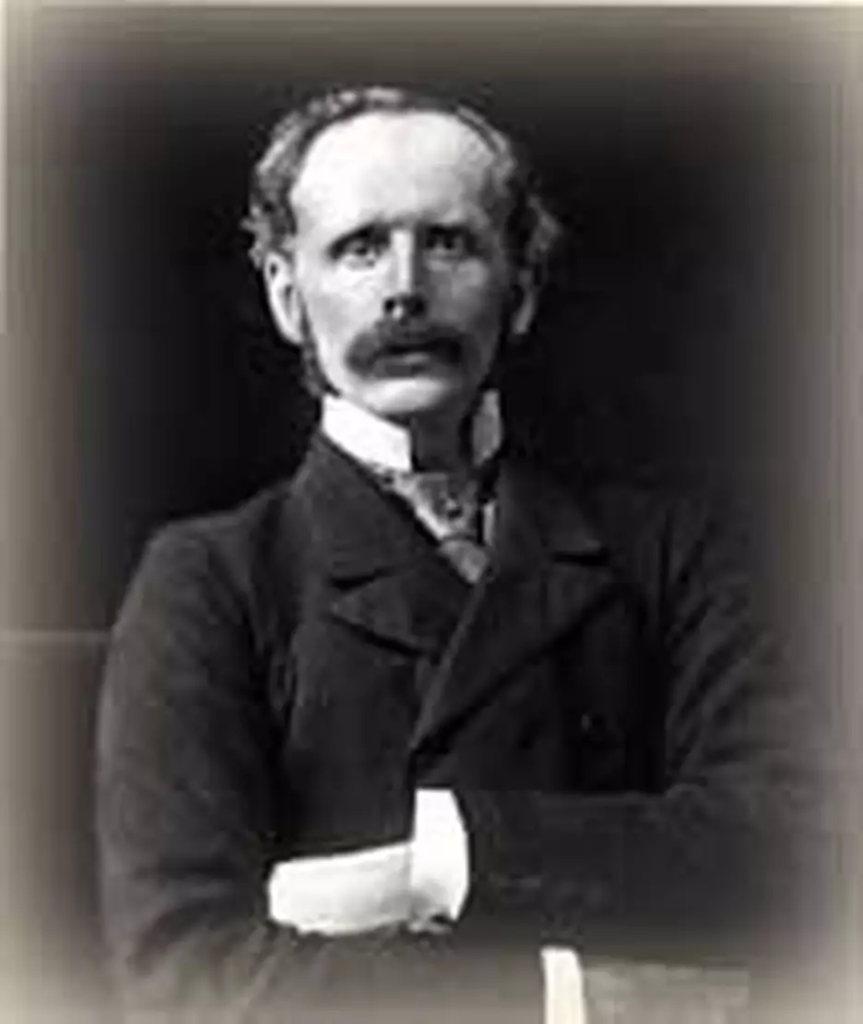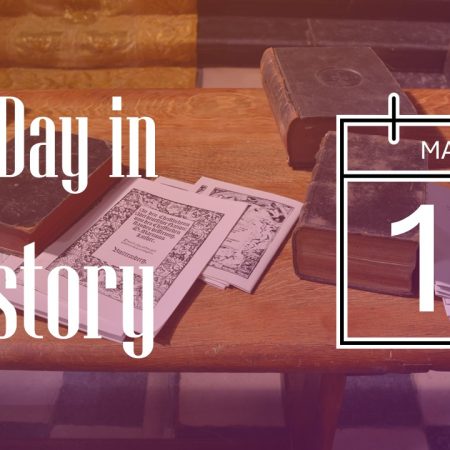
1559
In response to a sermon by John Knox, a Reformation mob burns churches in Perth, Scotland, and instructs the friars to hold mass no more.
1727
IMAGINE THE STIR twenty-year-old Felix Mendelssohn created in Berlin when he revived Johann Sebastian Bach’s neglected masterwork, The Saint Matthew Passion. On this day, 11 March 1829, a thousand people had to be turned away from the Sing-Akadamie for lack of room. Demand was so great a second performance had to be scheduled as soon as possible, and then a third. Ironically, the Sing-Akadamie’s director had balked at authorizing the performance, believing interest would be low.

Bach had first introduced the work one hundred-and-two-years earlier on this day, 11 March 1727, with perhaps as few as twenty singers divided into two choirs at the Thomaskirche in Leipzig. The libretto was largely taken from the Gospel of Matthew chapters 26 and 27, recounting the arrest, Crucifixion, burial, and Resurrection of Jesus. Interspersed between the Scriptures were related poems and hymns that added theological understanding to the bare biblical narrative.
Mendelssohn first became aware of the masterpiece at fourteen when his grandmother, Bella Salomon, a Bach collector, presented him with a copy of the score. He spent five years adapting it in preparation for its famous revival. Mendelssohn employed well over a hundred performers and cut the work almost by half. Conductors thought nineteenth-century audiences, accustomed to Classical and Romantic pieces, would not sit for three hours of Bach’s “dry,” old-fashioned, and “mathematical” baroque music.
Instead, the performance led to a major revival of Bach’s music, including his enormous repertoire of religious works. “Never have I known any performance so consecrated by one united sympathy,” wrote one participant. French composer Hector Berlioz marveled at the Bach mania, summing it up wittily with the words, “There is but one god—Bach—and Mendelssohn, his prophet.” By 1841, when Mendelssohn again led a performance, audiences were acclimatized to Bach and he restored many of the passages he had cut twelve years earlier.
Since its revival, Saint Matthew Passion has been performed in its entirety hundreds of times. In the Netherlands, for instance, many local ensembles make an annual Easter tradition of presenting the Passion. The Netherlands Bach Society has a fine free performance on YouTube (https://www.youtube.com/watch?v=ZwVW1ttVhuQ) as well as a performance of Bach’s shorter and sunnier Saint John Passion (https://www.youtube.com/watch?v=zMf9XDQBAaI).
If Mendelssohn was inspired by Bach’s monumental Passion, in the nineteenth century, twentieth-century Swiss composer Frank Martin declared that hearing it when he was ten-years-old was his most formative musical experience. Inspired by Bach’s use of two choirs, Martin composed his highly-regarded Mass for Double Choir also available on YouTube (https://youtu.be/J4c0ecGbtqY?si=YdfBBdtDTpSpNQur).
As is well-known, Bach wrote his music for the glory of God and for the re-creation of his listeners. Many pieces include abbreviations such as “I. N. J.” standing for In Nomine Jesu; that is, “In the Name of Jesus.”
HT: Dan Graves
1888
Samuel Zwemer preaches his first sermon—to a congregation of African-Americans in a small New Brunswick, New Jersey, church. He will go on to become a notable missionary to the Arab world.
1897
On this day, March 11, 1897, Henry Drummond, whom Dwight L. Moody called the most Christ like man he had ever known, left this world for eternity. Drummond had been in excruciating pain for two years, suffering from a malignant growth of the bones. Despite intense pain, he continued to be humble, unselfish and cheerful.

A Scottish free churchman from Stirling, Scotland, Henry Drummond was drawn into evangelical revival during Moody and Sankey’s tour of Britain in 1873. He followed up their work in Ireland and England, becoming skilled at helping all kinds of people in the “inquiry room.” In fact, people turned to Drummond for council and confession, throughout his life. Moody wanted Drummond to come help him in his ministry in America, but Drummond became a lecturer at the Free College in Glasgow on the natural sciences. He continued to do evangelistic work with young men and the poor throughout his teaching days.
After Moody’s 1884 campaign in England, he was relaxing with 21 of his fellow workers. The group urged Moody to give a devotional, but the great evangelist shook his head. “No, you’ve been hearing me for eight months, and I’m quite exhausted. Here’s Drummond, he will give us a Bible reading.”
Reluctantly, Drummond arose, pulled from his hip pocket a Testament and began to read 1 Corinthians 13. Without a note he expounded a message of which Moody said: “It seemed to me that I had never heard anything so beautiful, and I determined not to rest until I brought Henry Drummond to Northfield to deliver that address.” Indeed, Moody wished the message could be read in his Northfield schools once a year and “read once a month in every church ’til it was known by heart.”
Henry later issued the talk as a thin book The Greatest Thing in the World. In it he said, “You will find as you look back upon your life that the moments that stand out, the moments when you have really lived, are the moments when you have done things in a spirit of love.”
As the teaching of evolution emerged, Drummond made analogies between its ideas and the truths of the spiritual world. For example, he said that even in the animal world survival of the fittest is not simply based upon strength. Care and compassion are important. Scientists criticized him. But his popular style sold 70,000 copies of his Natural Law in the Spiritual World in five years.
Moody was criticized for maintaining a close friendship with Drummond because of his compromise with evolutionary theory, but Moody continued to find Drummond’s Christian character unimpeachable and his personal evangelistic work fruitful. Moody wrote that “Henry Drummond was one of the most lovable men I have ever known…It could be said of him truthfully, as it was said of the early apostles, ‘that men took knowledge of him, that he had been with Jesus’…Never have I known a man who, in my opinion, lived nearer the Master, or sought to do His will more fully.”
HT: Christianity.com
